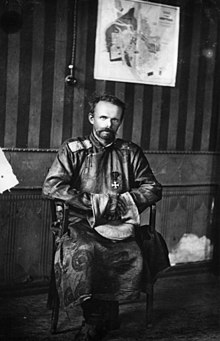Roman Ungern von Sternberg
|
Baron Roman von Ungern-Sternberg |
|
|---|---|

Roman Fyodorovich von Ungern-Sternberg, in 1921, in a Mongolian deel uniform with Russian Order of St. George 4th Class
|
|
| Born |
29 December 1885 Graz, Austria-Hungary |
| Died | 15 September 1921 (aged 35) Novosibirsk, Russian Soviet Federative Socialist Republic |
| Allegiance |
|
| Service/branch |
Imperial Russian Army White Army |
| Years of service | 1906–1921 |
| Rank | Lieutenant General |
| Commands held | Asiatic Cavalry Division |
| Battles/wars |
First World War Russian Civil War Mongolian Revolution of 1921 |
| Awards |
Order of St. George 4th Class Order of St. Vladimir 4th Class |
Baron Roman Nikolai Maximilian von Ungern-Sternberg (Russian: Барон Ро́берт-Ни́колай-Максими́лиан Рома́н Фёдорович фон У́нгерн-Ште́рнберг) (29 December 1885 NS – 15 September 1921) was an anti-Bolshevik lieutenant general in the Russian Civil War and then an independent warlord whose Asiatic Cavalry Division wrested control of Mongolia from the occupation of Mongolia by the Republic of China in 1921. He was often referred to as Baron Ungern, or simply Ungern.
Ungern was an arch conservative pan-monarchist who aspired to restore the Russian monarchy under Grand Duke Michael Alexandrovich of Russia and to revive the Mongol Empire under the rule of the Bogd Khan. In February 1921, he expelled Chinese troops from Mongolia and restored the monarchic power of the Bogd Khan.
In June 1921 he went on to invade East Siberia, in support of supposed anti-Bolshevik rebellions and to head off a Red Army-Mongolian partisan invasion, and this action led to his defeat and capture two months later. He was taken prisoner by the Red Army and a month later was put on trial for counterrevolution in Novonikolaevsk. After a six-hour show trial, he was found guilty, and on 15 September 1921 he was executed.
R.F. von Ungern-Sternberg was born in Graz, Austria, on January 10, 1886, to a noble Baltic-German family. The Ungern-Sternberg family was an ancient German noble family that settled in what is now Estonia during the Middle Ages. Ungern-Sternberg's first language was German, but he was also fluent in French, Russian, English, and Estonian. His mother was a German noblewoman named Sophie Charlotte von Wimpffen, later Sophie Charlotte von Ungern-Sternberg, and his father was Baron Theodor Leonhard Rudolph von Ungern-Sternberg (1857–1918).
...
Wikipedia
